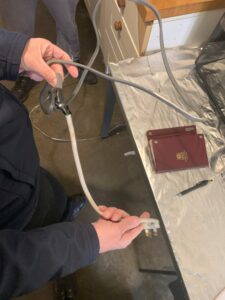Private health care provider fined for exposing workers to chlorine gas
A private health care provider has been fined after three workers received treatment following exposure to chlorine gas.
Anthony Coombes, an engineer from Sandhurst, Berkshire, was working at The Hampshire Clinic on Basing Road in Basingstoke when he was exposed to the potentially deadly gas on 11 March 2021.
He had been hired by Circle Health Group, the firm that runs The Hampshire Clinic, and asked to reduce the PH levels in the clinic’s hydrotherapy pool. However, there were no trained employees for the safe operation of pool plant at the clinic’s physiotherapy suite and Mr Coombes had not been fully trained in chlorine dosing operations or chemical storage.
He added sodium hydrogen sulphate, also known as sodium bisulphate, to the pool’s sodium hypochlorite tank which caused a reaction and resulted in the release of chlorine gas.

Mr Coombes was exposed to the gas and taken to hospital where he was given oxygen. Two other workers at The Hampshire Clinic were affected by the gas exposure and treated by doctors at the site.
Mr Coombes, 59, said in a statement: “I am just not the same person. I have lost my self-confidence, and don’t want work alone anymore, I won’t be a lone worker. My life nearly ended in two minutes, I now won’t work in a plant room on my own and I have lost work because I won’t work alone.
“My confidence is not what it used to be, I can’t travel on my own and I used to travel a lot. It has affected my life, it has affected my mind. I get depressed and think about how short life can be, it just plays on my mind, so I have been keeping myself to myself. I’ve gone a bit quiet really, I lack motivation to do things, my life could have been over so quick.”
Chlorine gas exposure can be fatal in minutes. Analysis by HSE’s Science Division indicated that the maximum volume of chlorine gas produced was nearly 8000 times over the workplace exposure limit (WEL) and nearly 400 times over the Immediately Dangerous to Life or Health (IDHL) Limit.
A Health and Safety Executive (HSE) investigation found that Circle Health Group fell far short in ensuring the health, safety and welfare of both its employees and contractors. Industry guidance for managing pool water treatment is well-known and been established for a significant period of time. Circle Health Group failed to put in place recognised industry standards of suitable risk assessments, adequate training as well as instructions and safe systems of work for the handling and mixing of chemicals.

HSE guidance can be found at: Swimming pool management: Leisure activities (hse.gov.uk)
Circle Health Group Limited, of Cannon Street, London, pleaded guilty to breaching Sections 2(1) and 3 (1) of the Health and Safety at Work etc. Act 1974. The company was fined £160,000 and ordered to pay £12,520.03 in costs at Basingstoke Magistrates’ Court on 20 June 2023.
HSE inspector Francesca Arnold said: “Swimming and therapy pool operators must comply with their general duties under the Health and Safety at Work etc Act 1974, which includes making a suitable and sufficient risk assessment of the health and safety risks to their workers and users including the risks of operating pool water treatment systems and the incompatible mixing of chemicals.
“Chlorine derivatives in pools are a well-established method of disinfectant provision and the accidental addition of acid to hypochlorite is the commonest cause of chlorine release incidents in pool buildings, it is fortunate that the injuries suffered were not more serious or even fatal.”
Notes to Editors:
- The Health and Safety Executive (HSE) is Britain’s national regulator for workplace health and safety. We seek to prevent work-related death, injury and ill health through regulatory actions that range from influencing behaviours across whole industry sectors through to targeted interventions on individual businesses. These activities are supported by globally recognised scientific expertise. hse.gov.uk
- More about the legislation referred to in this case can be found at: legislation.gov.uk/
- HSE news releases are available at http://press.hse.gov.uk




